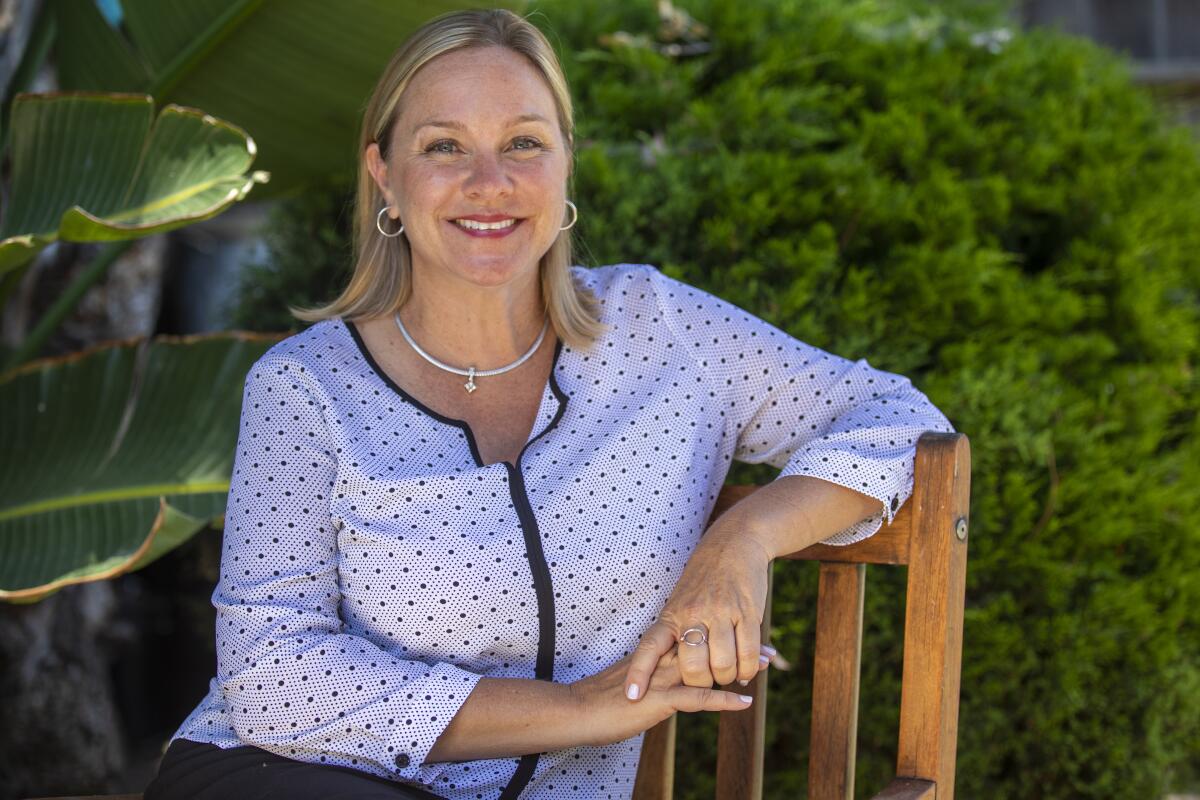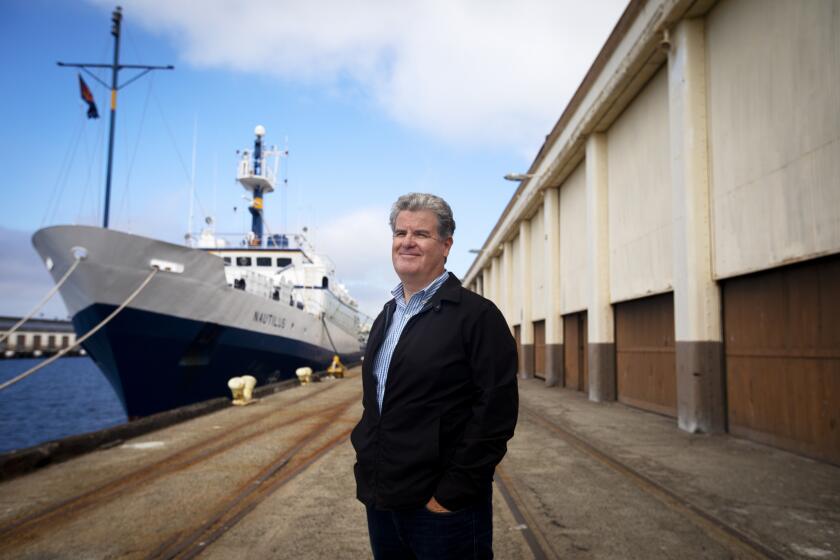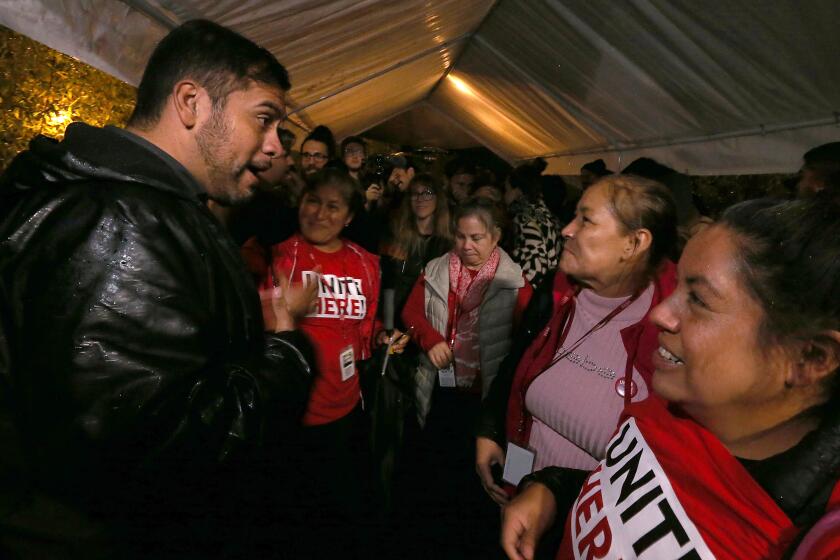Traci Park elected in Westside district, putting a record 6 women on L.A. City Council

- Share via
Municipal law attorney Traci Park claimed victory Thursday in the bitterly contested election to represent the Westside on the Los Angeles City Council, saying her more than 5,000-vote lead was too large for civil rights and criminal defense lawyer Erin Darling to overcome, eight days after the end of voting.
Her statement was followed minutes later by a concession statement from Darling, who trailed by nearly 6 percentage points, only a marginal narrowing of a large lead that Park had held since election day.
Park’s win will put six women on the City Council that will be sworn in Dec. 12, the most in L.A.’s history and a continuation of a trend. Karen Bass will become the city’s first female mayor, joining incoming City Atty. Hydee Feldstein Soto, also the first woman in that post. Women also hold all five seats on the once male-dominated county Board of Supervisors.
Park’s election in Council District 11 ends a string of victories in the fall election for progressive candidates in L.A. — including Kenneth Mejia as controller and Eunisses Hernandez and Hugo Soto-Martinez as City Council members. The city’s political left had hoped that, along with current Councilmember Nithya Raman and the others, Darling would be a fourth vote to spend less money on police and more on social services, such as mental health teams.
“We feel confident our lead will stand and declare victory,” Park said in a statement. “It is gratifying that we received more votes, thus far, than any other L.A. City Council candidate in the 2022 general election.
“I am humbled and honored that the constituents of CD11 have placed their trust and confidence in me to usher in a new era,” Park said. “Voters spoke convincingly that they want a different kind of leader and CD11 has sent a message that the Westside is done with ‘business as usual’ at City Hall.”
Hugo Soto-Martinez, Tim McOsker and Katy Young Yaroslavsky declare victory in their Los Angeles City Council races.
Darling acknowledged via Twitter that he and his advisors no longer saw a “path to victory.” He said he had been “heartened” by the support for his campaign, which he called “a last-minute, totally grassroots, at times shoestring-budget affair.”
He wished Park “the very best” in the hard work of healing “the rancor and divisiveness of the last two years,” adding that “the Westside and L.A. in general are in deep need of healing and leadership that transcends race and economic status.”
Park, 46, will succeed retiring Councilmember Mike Bonin in the district composed of communities from Pacific Palisades to Los Angeles International Airport. She has promised to promote more moderate policies than Bonin, who evolved into one of the most left-leaning voices on the 15-member council.
Bonin had faced a recall challenge supported by Park. But when that challenge failed to gain enough signatures, Bonin surprised many in his district by declining to run for a third term, citing concerns about his mental health.
That didn’t stop Park from effectively running against the incumbent. She painted the progressive Darling as a Bonin clone, blaming their purportedly permissive views for expanding the widespread homeless encampments that dot much of district, particularly Venice.
Park promised to vigorously invoke the city’s anti-camping ordinance to clear homeless encampments from areas around parks, libraries and other public facilities. Darling agreed with Bonin’s stance opposing the anti-camping law — Section 41.18 of the Los Angeles Municipal Code — saying that L.A. first needed to do more to construct temporary and permanent housing.
The two lawyers also disagreed sharply on city budget priorities. Park said the Los Angeles Police Department needed to be expanded to help curtail an uptick in crime, while the 41-year-old Darling said he would shift some money away from the LAPD to other priorities, particularly hiring mental health workers, to help unhoused people in crisis.
Each candidate lashed out at their opponent’s legal career. The Park campaign bashed Darling for representing an alleged rapist and other defendants, saying he favored criminals over victims. The Darling campaign slammed Park for representing management, “corporate” interests and, in one case, the city of Anaheim, when it was accused by an employee of racism.
Darling struggled to project his message as broadly as Park, whose $751,000 in spending in the runoff was more than 2½ times Darling’s. The progressive candidate took an even bigger hit from an independent expenditure campaign, funded largely by landlords, real estate interests and the city’s police union — with total outside dollars for Park of $1.4 million some five times more than independent expenditures for Darling.
Over the past year, four Los Angeles City Council members have lost their campaigns for reelection or higher office. A fifth could soon join them.
Darling used his opponent’s big-money backers to try to paint her as a tool of the rich and powerful. She, in turn, suggested he would be controlled by the most extreme segments of the left, including the Democratic Socialists of America and people who have noisily shut down City Council meetings.
Darling was promoted in the DSA voter guide, but the group did not vote to formally endorse him, so he was not a “priority” candidate, according to the group’s website. The Democratic Socialists instead focused more energy on other candidates, working actively to elect Raman in 2020, Hernandez in the June primary and now Soto-Martinez.
Darling, who was born and raised in Venice, relied heavily on a network of volunteers, who helped him win the June primary by more than 6 percentage points.
Park was once a Republican, but endorsements from a broad array of Democratic luminaries — including former Los Angeles Mayor Antonio Villaraigosa and Lt. Gov. Eleni Kounalakis — helped bolster her credentials as a mainstream Democrat. She had a diverse list of other backers, including business organizations and unions, especially those representing police and firefighters.
Raised in Downey and Apple Valley by a single mother who worked as a school secretary, Park often came to Los Angeles to visit with grandparents who lived in what would later become L.A.’s 11th Council District. Park worked her way through Johns Hopkins University in Baltimore and attended Loyola Law School in Los Angeles.
She has spent most of her legal career representing cities and other government agencies, most recently as a partner at Burke, Williams & Sorensen, a giant in the field. Park has advised and trained clients on issues such as gender parity and has defended cities against litigation.
“Whether you voted for me or not, I will work hard to represent you and be your voice on matters big and small at City Hall,” Park said, making clear her No. 1 priority by adding: “I will attack the homelessness crisis with the compassionate urgency required.”
Times staff writer David Zahniser contributed to this report.
More to Read
Sign up for Essential California
The most important California stories and recommendations in your inbox every morning.
You may occasionally receive promotional content from the Los Angeles Times.













